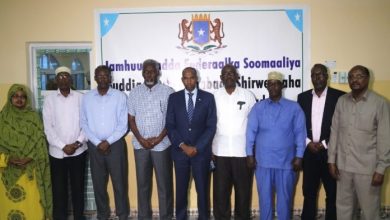Travel ban hampering refugee resettlement in Mankato
Travel ban hampering refugee resettlement in Mankato
Refugee resettlement in the Mankato area has slowed over the past year amid President Donald Trump’s attempts to ban travelers from certain Muslim-majority countries.
The local drop is a reflection of what’s happened statewide and nationwide, adding further uncertainty for refugees already in the middle of lengthy resettlement processes.
Somali refugees and their families awaiting reunification in Mankato have been most impacted by the ban.
Ben Walen, director of refugee services with the Minnesota Council of Churches, said his organization knows of 16 individuals who would’ve likely settled in Mankato before September 2018 if the ban never happened. Now he doesn’t expect them to arrive in Minnesota before the end of the year. And an arrival next year is anyone’s guess.
“There’s a lot of unknowns as they’ve implemented new processing measures overseas,” Walen said.
“I can almost certainly say it won’t be this year.”
Not knowing when the wait will end has been hard on families in the area, said Habiba Rashid, who settled in Mankato with her husband six years ago.
“Families here are panicking,” she said.
Now a community navigator in the council’s Mankato Area Refugee Services office, she waited six years before her resettlement here and another four afterward for her mom, dad and siblings younger than 18 to join — a timeline she describes as “lucky” compared to others. She said a term like “chain migration” is a misleading term for what should be thought of as family reunification.
Calling it chain migration also assumes refugees can just attach family members to their resettlement applications, which she said doesn’t resemble her experience or the experiences of the families she knows.
Apart from the refugees unsure of their arrivals, the number who ended up being settled here dipped last year. The Council of Churches, the main resettlement agency serving the Mankato area, resettled 15 individuals in the area last year, compared to 27 the year before.
Another resettlement agency, the Rochester-based Catholic Charities of Southern Minnesota, last resettled a refugee in the Mankato area in April 2016, said Kristina Hammell, the group’s director of refugee resettlement.
The decrease is similar to what statewide refugee agencies are seeing for Somali resettlement. Walen said Somalis coming to Minnesota accounted for 40 percent of his caseload in past years. Now they’re less than 20 percent.
“There’s been a limitation in the number of people coming to the country in the first place, and it’s had a tangible impact on the number coming to our communities,” he said.
The 15 who were resettled last year and 27 the year before were primary refugees who came to Mankato right after arriving in the country. Figures for secondary refugees, people who move to Mankato after first settling elsewhere in the U.S., are harder to tally.
Margo Druschel, associate director at the council’s Mankato refugee services office, said secondary refugee figures have followed a similar pattern.
“It was steady through the first three quarters, but then it fell off markedly in October through December and it’s been very limited since then,” she said.
The decline is likely a result of both the ban and the area’s tight housing market. It’s led to a shift in her office’s focus.
In the past they worked with more newcomers to the area — whether primary or secondary arrivals — but now they’re helping families who’ve been here longer. Rather than their employment services staff helping people find initial jobs, they’re helping people who’ve been working advance in their careers. They recently hired a new community navigator, Ahmed “Jaffer” Mohamud, to help in that realm.
Immigration work is also booming at the office these days. Refugees who settled in the area are as eager as ever to seek permanent residency after one year here or citizenship after five years.
Druschel said there’s been a 10 percent increase in permanent residents seeking citizenship in the last year.
“People who had been permanent residents and were comfortable renewing it realized it was important to exercise their right to vote, eliminate the risk of deportation, and travel outside the U.S.,” she said.
The office can also refer families to its Twin Cities office if they want to start the reunification process.
The ban has made the wait daunting, however, and ongoing court proceedings make a resolution hard to predict.
Each time the travel ban was implemented it was subsequently challenged in courts. The U.S. Supreme Court agreed to weigh the case next month but allowed the ban to be enforced while appeals proceeded until it expired in January.
Since then refugee arrivals haven’t picked up. The Minnesota Council of Churches hasn’t so far resettled any in the Mankato area in 2018.
While the initial ban led to chaos and detainings at multiple airports, one longer-term result is rampant uncertainty about when people who thought they were on the tail end of their resettlement processing will reunite with family already here.
Aid organizations try to comfort them, knowing many waiting for resettlement grew so restless they turned to dangerous crossings into Europe. Others who wait out the process in countries like South Africa, like Rashid’s family did, face xenophobic attacks.
All the individuals would be coming here because they have a connection here. When Rashid finally reunited with her family, she said it ended months of sleepless nights worrying a last minute hang-up would prevent their arrival.
Their arrival brought her a support system she didn’t have. Her family could finally meet her children born in the years between when she arrived and they followed.
If something came up at work, she could call them to watch the kids until she got home. Instead of sending portions of her earnings overseas to support them, she and her husband saved it to buy a home and car.
She tells families going through the uncertainty now to hold out hope, even as the ban’s impacts can still be felt.
“As an agency we’re here trying to help and let them know things will work out eventually even with this madness going on,” she said.
For the latest news update please visit Saafifilms.com For more entertainment visit Saafistudio.com





